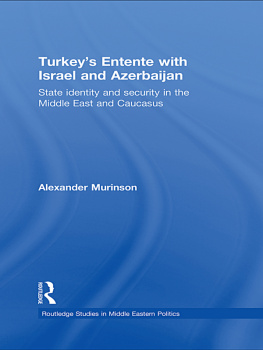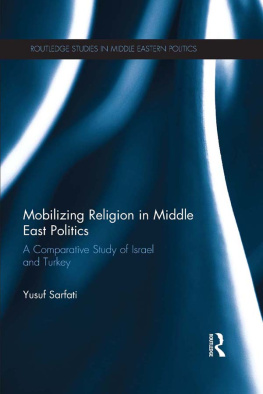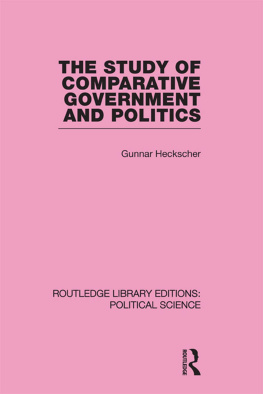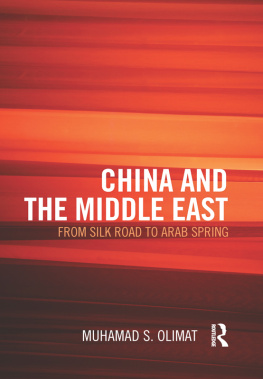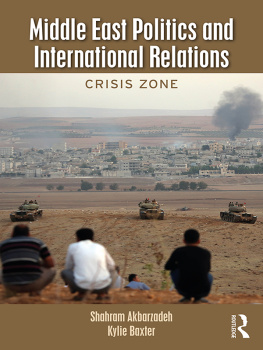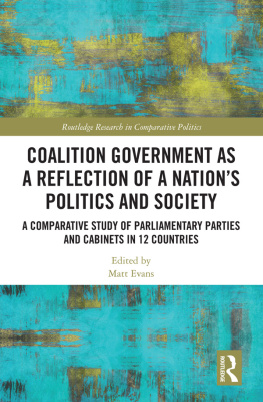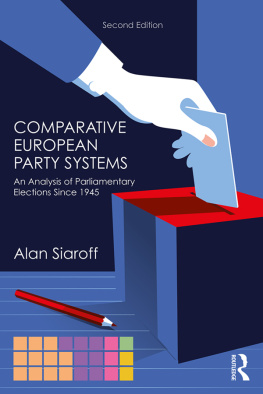ROUTLEDGE LIBRARY EDITIONS: POLITICS OF THE MIDDLE EAST
Volume 10
ELECTORAL POLITICS IN THE MIDDLE EAST
Electoral Politics in the Middle East
Issues, Voters and Elites
Edited by
Jacob M. Landau, Ergun zbudun and Frank Tachau
First published in 1980 by Croom Helm Ltd
This edition first published in 2016
by Routledge
2 Park Square, Milton Park, Abingdon, Oxon OX14 4RN
and by Routledge
711 Third Avenue, New York, NY 10017
Routledge is an imprint of the Taylor & Francis Group, an informa business
1980 Jacob M. Landau, Ergun zbudun and Frank Tachau
All rights reserved. No part of this book may be reprinted or reproduced or utilised in any form or by any electronic, mechanical, or other means, now known or hereafter invented, including photocopying and recording, or in any information storage or retrieval system, without permission in writing from the publishers.
Trademark notice : Product or corporate names may be trademarks or registered trademarks, and are used only for identification and explanation without intent to infringe.
British Library Cataloguing in Publication Data
A catalogue record for this book is available from the British Library
ISBN: 978-1-138-83939-7 (Set)
ISBN: 978-1-315-68049-1 (Set) (ebk)
ISBN: 978-1-138-92207-5 (Volume 10) (hbk)
ISBN: 978-1-315-68603-5 (Volume 10) (ebk)
Publisher's Note
The publisher has gone to great lengths to ensure the quality of this reprint but points out that some imperfections in the original copies may be apparent.
Disclaimer
The publisher has made every effort to trace copyright holders and would welcome correspondence from those they have been unable to trace.
ELECTORAL POLITICS IN THE MIDDLE EAST
Issues, Voters and Elites
EDITED BY
JACOB M. LANDAU, ERGUN ZBUDUN
FRANK TACHAU
CROOM HELM LONDON
HOOVER INSTITUTION PRESS
Stanford University, Stanford, California
1980 Jacob M. Landau, Ergun zbudun and Frank Tachau Croom Helm Ltd, 2-10 StJohn's Road, London SW11
British Library Cataloguing in Publication Data
Electoral politics in the Middle East.
1. Elections - Near East
2. Comparative government
I. Landau, Jacob M II. zbudun, Ergun
III. Tachau, Frank
329 .023 5604 JQ1758.A95
ISBN 0-7099-0454-1
Hoover Press Publication 241
1980 by the Board of Trustees of the
Leland Stanford Junior University
All rights reserved
International Standard Book Number: 0-8179-7 411-3
Library of Congress Catalog Card Number: 80-8333
The Hoover Institution on War, Revolution and Peace, founded at Stanford University in 1919 by the late President Herbert Hoover, is an interdisciplinary research center for advanced study on domestic and international affairs in the twentieth century. The views expressed in its publications are entirely those of the authors and do not necessarily reflect the views of the staff, officers, or Board of Overseers of the Hoover Institution.
Printed and bound in Great Britain
Contents
| Dou Ergil |
| Ralph E. Crow |
| Jacob M. Landau |
| Jacob M. Landau |
| Ergun zbudun |
| Iliya Harik |
| Asher Arian |
| Ergun zbudun |
| Frank Tachau |
| Samir G. Khalaf |
| Emanuel Gutmann |
| Frank Tachau |
- DMC Democratic Movement for Change
- DP Democratic Party
- Ind. Independents
- JP Justice Party
- MK Member of the Knesset
- NAP Nationalist Action Party
- NP Nation Party
- NRP National Religious Party
- NSP National Salvation Party
- NTP New Turkey Party
- RP Reliance Party
- RPNP Republican Peasant Nation Party
- RPP Republican People's Party
- RRP Republican Reliance Party
- SPO State Planning Organisation
- TLP Turkish Labour Party
- TUP Turkish Unity Party
When the editors of this volume first met in 1974 to discuss the project of analysing and comparing elections in competitive political systems of the Middle East, they were particularly attracted to this joint project. For, they soon found out, in Oscar Wilde's words, that they could resist everything but temptation.
Preparation of this book has required an intensive collective effort and considerable patience-even more than was anticipated. Every one of the nine contributors to this volume, including the three editors, has written a chapter in his field of expertise, incorporated in one of the three sections on electoral issues, voting behaviour, and the selected elites. In addition, each editor has tied up the functional section he was mainly responsible for with a concluding chapter for that section. All three editors share equally in the responsibility for the whole volume, and have also jointly prepared the introduction and epilogue. No less than in other joint products of this nature, collaboration has not always been easy, particularly as the contributors have resided in four lands Turkey, Lebanon, Israel and the United States. The civil war in Lebanon, particularly, hindered communication and delayed the completion of the whole book. The editors are grateful to the New York office of the American University of Beirut for its assistance in maintaining contact, and to Professors Crow and Khalaf for persisting in the face of awesome personal and professional obstacles.
Despite the sustained efforts of the editors, these events have perhaps served to accentuate some differences of emphasis among the contributors. Hopefully, most of the remaining differences result, rather, from the varying essence of research in the functional topics selected for analysis. One such consequence has been that the use of certain termssuch as 'left,' 'centre,' 'right' and some others-has not been identical, but generally reflects their bearing within a given situation in place and time. The editors have not always smoothed out such variances, since they do not believe that glossing over real differences would serve any constructive purpose. They are ready to assume the blame of omission and commission, wherever this has inadvertently occurred. Meanwhile, they enjoyed the time which they shared with one another and in addition with the other contributors in preparing this book.
Comparative Electoral Politics in the Middle East
This book emerged because of the need for comparative research on significant issues of contemporary Middle Eastern politics. Up to the Second World War, despite rising interest in the Middle East, the lack of a sufficient body of scholarly publications about it made serious comparative research unfeasible. Since then, so much has been published on almost every country in this area, that comparative political study can be readily envisaged, in order to provide scholars with an additional dimension of understanding of the area's complexities. That comparative political analysis on the Middle East has started relatively late was due, also, to the fact that the modern study of comparative politics is rather recent.
Several distinguished investigators have perceived this possibility and have enriched the body of published research by their studies. Methodologically, however, their approach has been, almost without exception, to discuss the subject of their choice, country by country, then to reach some comparative conclusions in a final chapter. This has been the case, for instance, when comparing one Middle Eastern country to another outside this region, such as Turkey and Japan (in what are otherwise excellent functional 'case studies').


